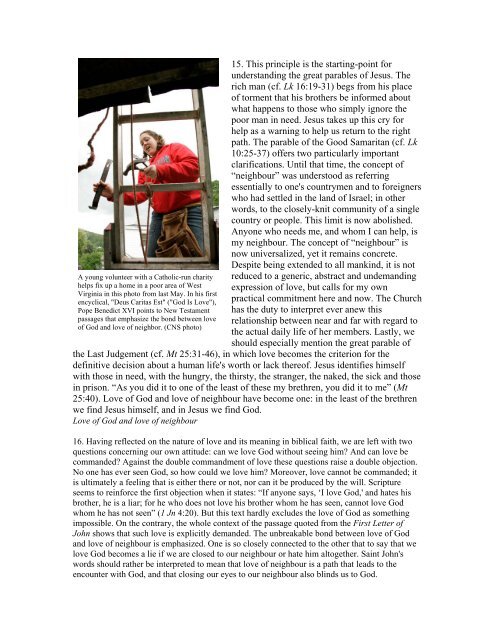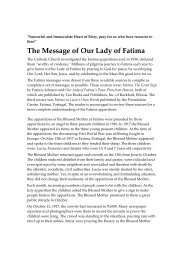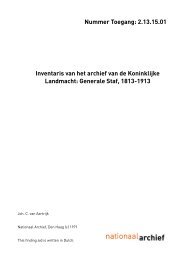God Is Love - Beeldbibliotheek
God Is Love - Beeldbibliotheek
God Is Love - Beeldbibliotheek
- No tags were found...
You also want an ePaper? Increase the reach of your titles
YUMPU automatically turns print PDFs into web optimized ePapers that Google loves.
A young volunteer with a Catholic-run charityhelps fix up a home in a poor area of WestVirginia in this photo from last May. In his firstencyclical, "Deus Caritas Est" ("<strong>God</strong> <strong>Is</strong> <strong>Love</strong>"),Pope Benedict XVI points to New Testamentpassages that emphasize the bond between loveof <strong>God</strong> and love of neighbor. (CNS photo)15. This principle is the starting-point forunderstanding the great parables of Jesus. Therich man (cf. Lk 16:19-31) begs from his placeof torment that his brothers be informed aboutwhat happens to those who simply ignore thepoor man in need. Jesus takes up this cry forhelp as a warning to help us return to the rightpath. The parable of the Good Samaritan (cf. Lk10:25-37) offers two particularly importantclarifications. Until that time, the concept of“neighbour” was understood as referringessentially to one's countrymen and to foreignerswho had settled in the land of <strong>Is</strong>rael; in otherwords, to the closely-knit community of a singlecountry or people. This limit is now abolished.Anyone who needs me, and whom I can help, ismy neighbour. The concept of “neighbour” isnow universalized, yet it remains concrete.Despite being extended to all mankind, it is notreduced to a generic, abstract and undemandingexpression of love, but calls for my ownpractical commitment here and now. The Churchhas the duty to interpret ever anew thisrelationship between near and far with regard tothe actual daily life of her members. Lastly, weshould especially mention the great parable ofthe Last Judgement (cf. Mt 25:31-46), in which love becomes the criterion for thedefinitive decision about a human life's worth or lack thereof. Jesus identifies himselfwith those in need, with the hungry, the thirsty, the stranger, the naked, the sick and thosein prison. “As you did it to one of the least of these my brethren, you did it to me” (Mt25:40). <strong>Love</strong> of <strong>God</strong> and love of neighbour have become one: in the least of the brethrenwe find Jesus himself, and in Jesus we find <strong>God</strong>.<strong>Love</strong> of <strong>God</strong> and love of neighbour16. Having reflected on the nature of love and its meaning in biblical faith, we are left with twoquestions concerning our own attitude: can we love <strong>God</strong> without seeing him? And can love becommanded? Against the double commandment of love these questions raise a double objection.No one has ever seen <strong>God</strong>, so how could we love him? Moreover, love cannot be commanded; itis ultimately a feeling that is either there or not, nor can it be produced by the will. Scriptureseems to reinforce the first objection when it states: “If anyone says, ‘I love <strong>God</strong>,' and hates hisbrother, he is a liar; for he who does not love his brother whom he has seen, cannot love <strong>God</strong>whom he has not seen” (1 Jn 4:20). But this text hardly excludes the love of <strong>God</strong> as somethingimpossible. On the contrary, the whole context of the passage quoted from the First Letter ofJohn shows that such love is explicitly demanded. The unbreakable bond between love of <strong>God</strong>and love of neighbour is emphasized. One is so closely connected to the other that to say that welove <strong>God</strong> becomes a lie if we are closed to our neighbour or hate him altogether. Saint John'swords should rather be interpreted to mean that love of neighbour is a path that leads to theencounter with <strong>God</strong>, and that closing our eyes to our neighbour also blinds us to <strong>God</strong>.












